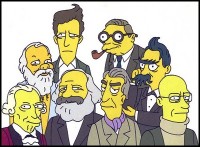Another problem on the way to a solution is consciousness. This is a problem for much the same reasons that thinking about life is: how can the brain, a biological (material) mechanism, cause conscious (apparently immaterial) states, and how are those states realised in the brain?
Next to consciousness is the even trickier “free will” problem. Could there be a scientific solution? The problem of free will is how to reconcile our experience of our free actions with what we believe about causation. Our general approach to reality seems to presuppose causal determinism. If you ask why the Oakland freeway collapsed in 1989, I can tell you about the Loma Prieta earthquake. Given the way the causes worked, the freeway “had” to collapse; the causes were “sufficient” for it to collapse.
Because we assume there must be some such story for all events, including human actions, there seems to be an easy solution to free will: it does not exist. All our actions are caused. They have causally sufficient conditions which determine that the actions happen once the causes happen. Why can’t we just accept that and go home?
The reason is that it is part of our conscious experience of voluntary intentional action that we can only proceed on the assumption of free will. If you believe that rainbows are systematic illusions, you can lead your life consistently on that basis. But if you believe that free will is an illusion, you cannot live your life on that basis.
Try this. You are in a restaurant and the menu has only two items to chose from: veal scaloppini or spaghetti bolognese. You cannot say to the waiter: “Look, I am a determinist. I know my order is determined, so I will wait and see what I order. Che sarà, sarà.”
Now why not? Because your answer is only intelligible to you if you assume that giving it was a free action on your part: you did not wait for your mouth to open and for these noises to come out, and you experienced the saying of the words as a manifestation of the freedom we are examining. Action is unlike perception. What you see on the menu is experienced as being not up to you: it is fixed both by your own perceptual apparatus and by the impact of the external stimulus (the menu options) on that apparatus. What you decide to do about those options, on the other hand, is experienced as being up to you.
So we are stuck with the presupposition of free will, even if we embrace determinism. It is a feature of conscious human thinking, deciding and acting that we experience these activities not as causally continuous, but as containing causal gaps. These gaps are the perceived absence of causally sufficient conditions. I will not experience the gaps if someone shoves me into the English Channel, but I will if I set out to swim it.
In that case, there is a perceived gap between considering whether or not to swim the Channel, and making up my mind to do it. There is another gap between making up my mind and jumping in. And there is a third between jumping in and completing it. All three are parts of a single continuous gap in free, voluntary, conscious action. We cannot shake off the conviction of free will because we cannot shake off the experience of the gap. But is the gap real or illusory?
All our conscious states, including our conscious experience of the gap, are caused by neurobiological processes. At the conscious level we experience freedom because we sense we have alternatives, and that our actions are not fixed by prior causal conditions. At the neurobiological level, all of those experiences are fixed by brain processes.
So if the experience of freedom is real, there must be an indeterminism in the brain corresponding to the gaps. If free will is real, there cannot be causally sufficient neurobiological conditions moving us from contemplating alternatives to deciding between them. To suppose that free will is not an illusion is to suppose that the “gaps” in our thought processes are paralleled by “gaps” in neurobiology. But the brain has no gaps.
Two hypotheses emerge. Hypothesis One says that free will is an illusion, that our consciousness of free action is as illusory as our experience of rainbows as “real” objects. Hypothesis Two says that our experience of free will reflects something real in the brain mechanisms that produce and sustain consciousness. But what could that mean?
Let us consider the problem in engineering terms: how would you design a machine capable of knowledge, ethical behaviour and the sense of free will? Using Hypothesis One, the machine has to be conscious and experience free will, though it lacks it. It has to experience the gaps, though its decision-making process makes no difference to the outcome. With Hypothesis Two, however, the machine’s decision-making process does make a difference. The gap is not only psychologically real, it is neurobiologically real. For that to be possible, there would have to be some indeterminism, some lack of causally sufficient conditions in nature.
As far as we know, the only established indeterminism in nature is quantum mechanics. But at the quantum level, the absence of causally sufficient conditions produces randomness, and randomness is not the same as free will. (Contrary to popular opinion, determinism is not the natural, or default, position in nature. Quantum indeterminacies are built into the structure of the universe from top to bottom, but tend to cancel themselves out at the macro level.)
So with Hypothesis Two, when the machine produces conscious decision-making, it would have to produce the indeterminacy of the quantum level without its randomness. I am not sure that this makes sense in physics, but it is the best I can do, if I treat the existence of free will as a serious possibility in neurobiology.
Now, if we had to choose between the two hypotheses, we would surely bet on Hypothesis One, given what we know about the world. The only argument I can think of against it is that it is totally unlike biological evolution to give us an extremely costly phenotype (conscious rational decision-making) that plays no role in the survival of the organism. We have to suppose that the enormous blood flow to the conscious brain, and the enormous time spent educating the young to make rational decisions, makes no difference, since all decisions are fixed by deterministic neuronal processes.
If Hypothesis One runs dead counter to evolution, Hypothesis Two is consistent with our experiences, but seems crazy. Besides, it gives us three mysteries for one: to solve the mystery of free will, you have to solve the mystery of consciousness, and you do that by relying on the mystery of quantum mechanics. Hypothesis One is consistent with our scientific view of how the world works, but we cannot live with it.
When I discussed these issues in a lecture in London, someone in the audience asked: “If Hypothesis One were demonstrated to be true, would you accept it?” Notice the form of the question: if it were demonstrated that there is no such thing as free, rational decision making, would you freely and rationally decide to accept that demonstration?
Profile
John Searle is Slusser Professor of Philosophy at the University of California, Berkeley. He has written 17 books, including his Reith Lecture series, Minds, Brains and Science (Penguin/Harvard). His “Chinese room” argument attracted much attention by trying to show that digital computation by itself is not sufficient for thinking – that there is more to thinking and understanding than manipulating symbols. This essay is based on his latest book, Freedom and Neurobiology, just published by Columbia University Press.










